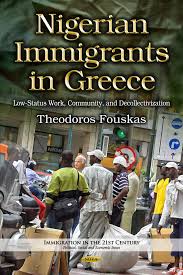Migrant Tales insight: Dr Theodoros Fouskas, a lecturer at the New York College, Greece, is no stranger to our blog. We’ve published two stories about his research and work. Taking into account the economic and political hardships that Greece faces and how this had impacted migrants, Migrant Tales believes it has a responsibility to show the good work being done by researchers like Dr Fouskas.
We wish him the best luck in the lunching of his latest book below.
__________________
|
Book Description:
• How does low-status work of Nigerian immigrants affect their organization and representation in immigrant community associations and unions? • How do Nigerian immigrants perceive and what practices do they develop towards the collective organization, representation and claim of work rights?The sociological research in this book emphasizes that the lack of permanent employment and restriction of immigrants in precarious, low-status/paid occupations distance them from both collectivities and claims. By introducing a new perspective on the investigation of the migration phenomenon in Greece, this book contributes significantly to relative international research and literature. This makes it an extremely useful source for researchers and students, public agencies or bodies and for those dealing with the phenomenon of immigration and immigration policy. In the first part of the book, the clarification of the theoretical concepts of community, occupational community and low-status work in the migration context is attempted. The impact that low-status/paid work has on immigrant collectivities is analyzed and the types of immigrant community associations and the attitude of the Greek trade unions towards the immigrants are discussed. Moreover, an overview of international empirical research on Nigerian immigrants, as well as on studies that focus on the investigation of immigrant community associations in Greece is endeavored. The second part of the book concentrates on the consequences low-status/paid work has on the collective organization and representation of the immigrant workforce. The micro-sociological research and analysis examines the case of Nigerian immigrants in Greece and how the frame of their work and their employment affects their participation in the immigrant hometown association Nigerian Community in Greece and in Greek trade unions. The results based on in-depth interviews demonstrate that due to the ramifications of their work, Nigerians are cut off, do not claim established workers’ rights and do not seek membership in any community associations or unions. In contrast, Nigerian immigrant workers depend on informal and impersonal social networks in search of solidarity and thus resort to alternative means of ensuring survival in Greek society, choosing individualistic and materialistic perceptions and attitudes of regulating their difficulties and workers’ rights, far from collectivities, often resigning from them completely. (Imprint: Nova) |
|
Table of Contents:
Foreword pp.ix-xiiList of Tables pp.xiii-xiv List of Figures pp.xv-xvi About the Author pp.xvii-xviii Acknowledgments pp.xix-xx Abbreviations pp.xxi-xxii Introduction pp.xxiii-xxxv PART 1. pp.1-2 Chapter 1. Theoretical Clarifications pp.3-28 Chapter 2. International Research on Nigerian Immigrants pp.29-38 Chapter 3. International Research on Immigrant Associations in Greece Chapter 4. Research Methodology pp53-62 Chapter 5. Immigrants from Nigeria in Greece pp.63-140 PART 3. pp.141-142 Chapter 6. Epilogue pp.143-158 Appendix: Statistical Data on Nigerians pp.159-166 Bibliography pp.167-238 Index pp.239-251 |
To order book visit Nova Publishers here.

